Publisher at The American Bystander
is Blogmom of Hey Dullblog. His novels and parodies have sold 1.25 million copies in 25 languages. He lives in Santa Monica, CA, and runs The American Bystander all-star print humor magazine.
Latest posts by Michael Gerber
(see all)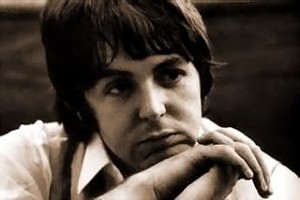
Paul McCartney, possibly empathizing
NANCY CARR • Over the years, and especially as a solo artist, Paul McCartney has written many songs expressing empathy toward others. Being the analytical list-making obsessive I am, I’ve created a catalog of them.
Note that I’m not arguing that writing such songs shows McCartney to be a better or more empathetic human being than his former bandmates; I’m interested here in the way his imagination works. John Lennon’s written a couple of songs I’d put in the empathetic category (“Whatever Gets You Through the Night” and “Bless You” spring to mind), but often his songs addressed to “you” adopt a tone of warning or advice (“Instant Karma,” “Working Class Hero,” “Crippled Inside”).
The list that follows uses this format: Title of song / year released or recorded / Who song is about, and who it is addressed to / Brief synopsis of the song’s content. (Once upon a time it was a table, which was a more convenient format, but I can’t post a table into the blog format without wreaking havoc.)
For the list and some thoughts about what it might mean, click “read entire post” below. (And thanks to commenter Ingrid, who expressed interest in this idea and inspired me to post it, already!)
Paul McCartney’s Songs of Empathy
A Catalog by Nancy Carr, 2012
1. “Eleanor Rigby” / 1966 / “all the lonely people”/ About title character, Father McKenzie, etc.; addressed to listener / Notice all the lonely people; wonder how they got that way and feel for them.
2. “Lady Madonna” / 1968 / About and addressed to title character and her children / How do you manage to take care of so many children and yourself? How do you survive, given all the demands on you?
3. “Hey Jude” / 1968 / About and addressed to Julian Lennon / Your situation seems dire, but you can make it better – and you don’t need to wait for someone else to act.
4. “Another Day” / 1971 / About unnamed female office worker; addressed to listener / Watch this woman go to and suffer through her boring office job, then go home and have sex with a guy who leaves as soon as he gets what he wants. Understand how sad she is.
5. “Don’t Let It Bring You Down” / 1978 / About and addressed to “you” (the listener) / You’ll go through hard times, and there’s no way off that carousel. Don’t lie low and stay away from your friends when you’re suffering; don’t let the hard times break your spirit.
6. “Daytime Nighttime Suffering” / 1978 / About unnamed woman; addressed to her romantic partner / Hey, what’s your wife getting in exchange for giving up her dreams and all the work she does/ Plenty of suffering, that’s what.
7. “Somebody Who Cares” / 1982 / About and addressed to “you” (the listener) / I know that everything’s falling apart for your and you think you don’t matter to anyone, but you’re wrong. Someone always cares; just don’t hide away, or no one can help you. I know how you feel.
8. “Lindiana” / 1984 (unreleased) / About and addressed to title character / You’re struggling with life; I know it’s complicated. If I can help you with anything, I’ll be very glad. Don’t give up on what you’re doing; hold on.
9. “Footprints” / 1986 / About unnamed old man, addressed to listener / I see the old man gathering wood in the snow; does he see me? He likes the the snow because it covers his sad memories. He can’t help hoping she can’t come back someday, but his only companion is a magpie he throws some crumbs to. Feel for him.
10. “Put It There” / 1989 / About a man and his young son, addressed to listener / The father tells his son: “Put your hand in mind, because connection is all that matters in the end. However heavy the burden you’re carrying, I want to share it. I’m always there for you.”
11. “The World Tonight” / 1997 / About and addressed to unnamed person, possibly a celebrity / I see what you’re going through—being badgered by people who want something from you, being hurt by what you overhear people saying about you,. I’ve been through something similar, and you’ll come out the other side.
12. “Souvenir” / 1997 / About and addressed to “you” (someone the speaker loves) / Talk to me when you’re sad, and let me help you. Everything will be all right.
13. “Little Willow” / 1997 / About and addressed to “you” (person willow tree stands for? Dedicated to Princess Diana after her death, after initial release of song) / The wind’s going to blow hard, but bend and you won’t break. Hold on; I see what you’re going through.
14. “She’s Given Up Talking” / 2001 / About unnamed schoolgirl (apparently based on a friend’s daughter, who wouldn’t talk in school for a year); addressed to listener / Notice that at school this girl says nothing to anyone, but she does plenty of talking at home. Someone’s frightened her or made her angry, but no one seems to be doing anything about the situation.
15. “Why So Blue?” / 2007 / About and addressed to “you” (“my fine young friend”) / Why are you down? You’re wandering around feeling lonely. But look, you’ve met someone and felt a connection; now you’re no longer blue. I’m happy for you.
I won’t indulge in lengthy analysis of this catalog, but will make a few remarks about what it suggests to me.
McCartney often writes songs in which the speaker is observing a person or persons closely, describing what he sees, and by extension asking the listener to pay attention and empathize with the subject. “Eleanor Rigby” is the most obvious example, with its repeated admonition that we “look at all the lonely people” and observe their solitary actions.
He also writes songs of encouragement that are about and addressed to “you,” the listener. These include “Don’t Let It Bring You Down,” “Somebody Who Cares,” “The World Tonight,” and “Why So Blue.” The first two songs are especially general—they could apply to any listener, and deal with the inevitable downswings of life. “Don’t Let It Bring You Down” offers an intriguing counterpoint to Lennon’s later “Watching The Wheels.” Lennon says he’s “no longer riding on the merry-go round,” while McCartney says “up and down your carousel will go,” and apparently there’s no option to get off. [“Hey Jude” would also fit the general addressed-to-you-the-listener category, if we didn’t know from information outside the song that it was inspired by Julian Lennon.]
McCartney’s songs of empathy often center on women. “Eleanor Rigby,” “Lady Madonna,” “Another Day,” “Daytime Nighttime Suffering,” “Lindiana,” and “She’s Given Up Talking” all focus on the suffering of a female character. Why this is so would be worth pursuing by a biographer interested in understanding McCartney through his work.
Finally, songs of empathy appear throughout McCartney’s career, suggesting this mode is a lasting part of his character. There is, however, a notable absence of them between 1972 and 1977 (maybe he was especially happy then?). My suspicion is that one of the functions of McCartney’s empathetic songs is self-comfort. This might explain why the 90s and later see a pretty steady frequency of empathetic songs, as he’s been dealing with Linda’s illness and death and his divorce from Heather Mills.
Other ideas about this pattern welcome!


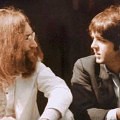
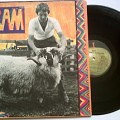
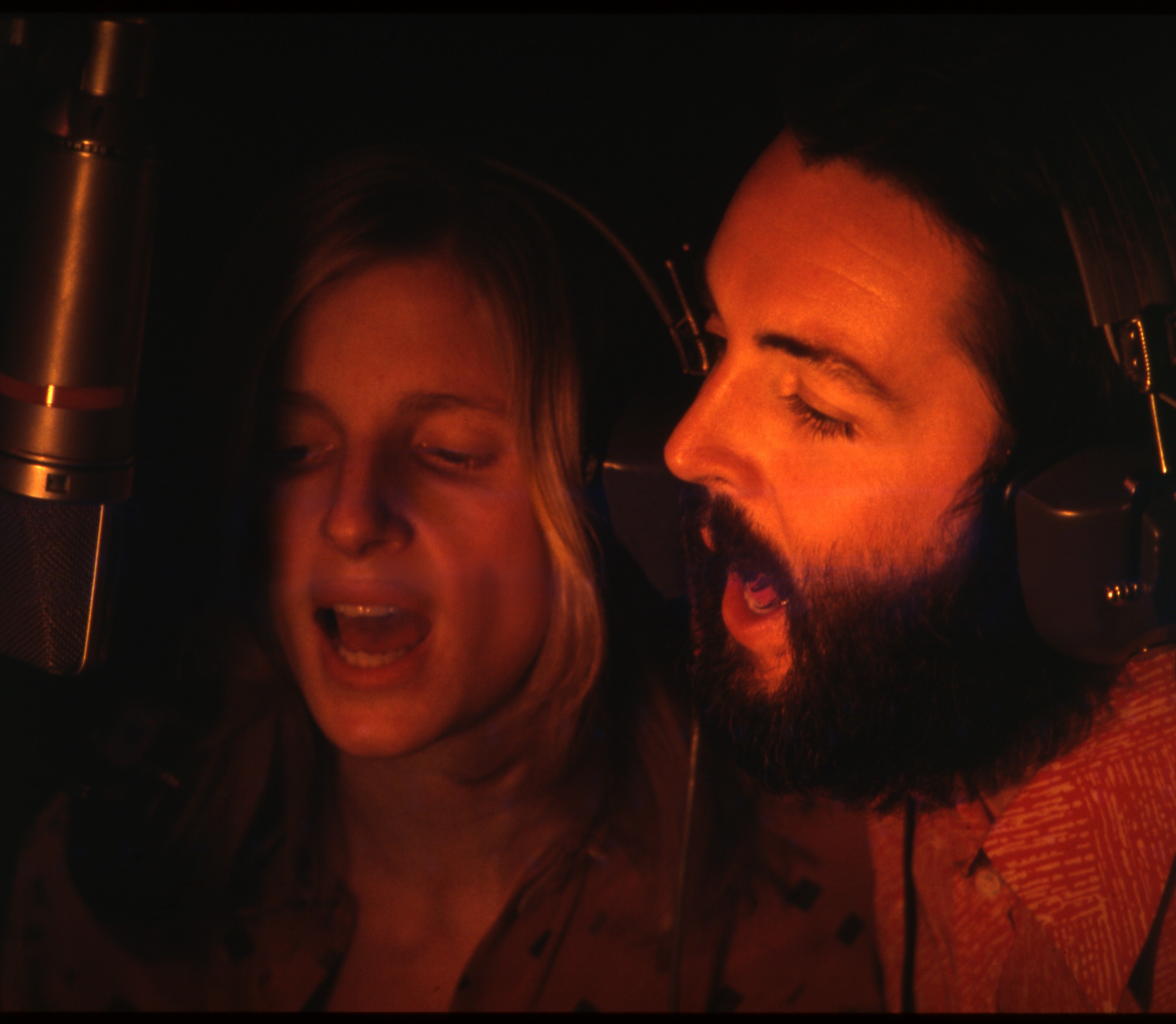
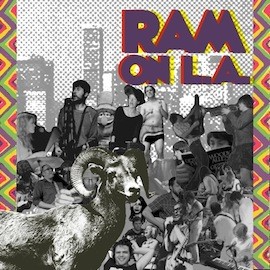
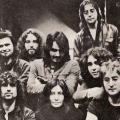

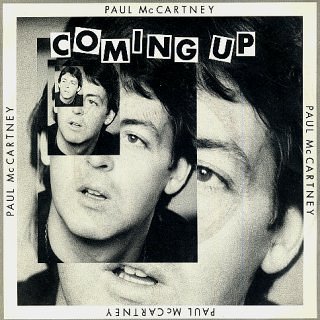
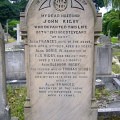
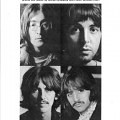
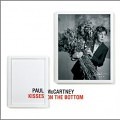

I’m sure in pointing this out that I’m joining legions hidden by the comment approval process, but Paul wrote “Little Willow” for Mo Starkey after she passed away.
Great list; great idea.
Matt M., thanks for that clarification; I hadn’t heard that about Mo and “Little Willow.” So it’s another “Hey Jude”—a universal-sounding song written for an individual.
I remember one interview with Paul where he talked about Little Willow having been written for Mo and also mentioned that he and Linda had sat down and listened to it one day and then realised (paraphrasing) ‘shit, it’s about us now too’ which is just ughhhhh. 🙁
I have noticed this trend before of particular empathy and consideration for women in songs and quite often ‘everyday’ people and I find it incredibly endearing and interesting. One commentator once said that when John wrote in his solo years his songs tended to be addressed/about either ‘the world’ (particularly peace/politics ones) or him and/or Yoko. Paul, on the other hand, often kept his songs universal in terms of writing generalities but were often reaching out a hand in comfort etc… Paul definitely has tended to couche even his most personal, introspective songs (barring Here Today, etc) in more general or symbolic lyrics and it bugs me when ‘story songs’ are dismissed for being just that when they speak much of a person’s character and thoughts.
Enjoyed the post, thanks.
Anon, I’m also bugged when “story songs” are dismissed; the kinds of stories we tell inevitably reveal a great deal about us, and are as revealing, in their way, as the most directly confessional writing. I also think artists are pretty much what they are, irreducibly: someone with a storytelling bent is going to write stories, while somebody with an autobiographical bent is going to write more obviously about themselves.
About Lennon and McCartney particularly, that observation about Lennon in the solo years writing either about the world generally or about himself and Yoko very personally rings true to me.
I’m amazed by how often McCartney’s narrative songs are either ignored or dissed. For example, one of the myriad reasons Howard Sounes’ McCartney biography “Fab” is extraordinarily disappointing is Sounes’ not getting the story songs at all. (I don’t think he gets McCartney’s music more generally, but that would be a whole other post.) For example, in his discussion of “Electric Arguments,” Sounes claims that the song is about Heather Mills and then snarkily adds that you can tell this even though McCartney “has always been careful” to hide such references.
Two big problems here: one is the assumption that McCartney writes story songs merely because he’s too cowardly to name names. The other is Sounes’ lack of interpretive skills: “Highway” is a nasty song about Mills even though the chorus is “What she’s got is what she needs / And what she loves is me”? Yeah, right.
I agree with you that McCartney’s empathy songs (great post, by the way!) have a self-comfort function. I think this comes across very strongly in “Eleanor Rigby,” since so many of the poignant details about the lonely characters have resonance with elements of Paul’s and the Beatles’ situation.
Paul has said that the Beatles were looking to distance themselves from “the Beatles” at the time – they had definitely seen the darker side of their naive dream of being the most famousest band ever ever. And Eleanor is this pathetic character who still clings to a naive dream and hides her disappointment from the world. Meanwhile, father Mac writes for an audience that he knows doesn’t hear him. He finally buries the naive, pathetic dreamer and almost literally washes his hands of her and turns his back on her. The whole narrative works pretty well if the characters are two parts of Paul trying to deal with the disillusionment and isolation of Beatlehood.
I believe Paul has actually endorsed a self-comfort interpretation of part of “Hey Jude” as well. I think he claimed once that, “You have found her, now go and get her,” was addressed to himself.
Good comment, Stew.
Your comment made me realize that whenever I hear McCartney singing a story song, I think he’s often revealing lots of himself; and when I hear Lennon revealing himself in song, I think he’s often just telling a story.
I agree with last post regarding Mccartney revealing lots of himself through a story song. A year or so before Tug of War i read a story in a magazine of a young woman claiming to be Paul’s daughter. She claimed that when the Beatles were in Hamburg in the early years, Paul had a relation with a woman, and she was her daughter. At the same time, the end of the seventies or beginning of eighties England and part of the worls was going through an economic crisis.
I always think about this story when listening to “the pound is sinking” and then suddenly the lyrics with all that irony make a lot of sense.
Comment by “Anonymous,” logged on the old Blogspot blog this morning:
“Actually, the woman who claimed to be his daughter (the Hamburg progeny) turned out not to be his daughter (proved thru DNA), but the thing was Paul didn’t know she wasn’t his daughter until the tests were completed, which tells a story by itself. One song left off: “Jenny Wren”. A classic sympathetic story song about a woman who sees things the rest of the world doesn’t see, and is not understood by the world at large as a result. And what about “Rocky Raccoon”? I’ve always wondered about that song. Any ideas?”
Do you think
“Back On My Feet” / 1987
is an example of this? (The b-side of “Once Upon a Long Ago”).
https://www.the-paulmccartney-project.com/song/back-on-my-feet/
It’s addressed to the listener, and quite cinematic in the way it asks us to imagine a man “screaming at the sky” and a girl “shouting at the world”. The first verse seems to be McCartney imagining himself in some future where he’s “living on a park bench”.
Elvis Costello collaborated on the song, and he says he contributed the unsympathetic (his word) lines including “He’s a case where there’s clearly no hope”. That comment reminded me of Give My Regards to Broad Street, where McCartney emphasises that *he* is sympathetic towards Harry, and gives him the benefit of the doubt when everyone else assumes the worst.
Meaigs, I think that “Back on My Feet” does qualify. It rather reminds me of “My Brave Face” in that it’s a story song about a man who is alone and struggling — interestingly, written around the same time.
“Mistress and Maid” / 1993
Good one! Of all his collaborations with Costello, this one I really like. During a bout with McLennonitis, I thought he might be singing about himself here, with John the obvious man getting his tie loosened (rather than straightened, under the watchful eye of image conscious Paul) and bringing characters from a magazine to life (just as a harp-like instrument comes in, sounding rather like Benefit of Mr. Kite for a moment).
Interesting. The “look at me” line evokes more than one John song, so I’d have reversed those roles.
Good point! I just checked the lyrics again, and he repeats that three times, much like John does in the POB song. Also in the lyrics, but not altogether convincing they relate to other songs are “It won’t be long” and the opening, “She said” and the way he sings it sort of reminds me of She Said, She Said. Maybe the “look at me” line is a Paul saying, I feel the same.
Yes, good points meaigs and Michelle! “Women and Wives” from McCartney III also fits under this umbrella, I think. It’s an interesting mix of empathy and exhortation: “Hear me, women and wives / Hear me, husbands and lovers / What we do with our lives / Seems to matter to others” are the opening lines.
“For No One” is surely an early song of empathy:
McCartney’s lyrics speak directly to an unknown person suffering through the end of a love affair.
(I know his song probably is about his own situation with Jane Asher, but Paul’s use of “you” and “your” rather than “I” and “my” makes the composition more universal and empathetic.)
Yes, I agree Sam! It’s a particularly interesting song because McCartney seems to be prospectively emphasizing with himself — although also blaming himself for being in need of empathy. And I agree that the use of “you” makes it more universal and, I’d say, somewhat dissociative: McCartney seems to be watching himself from a distance, going through something that hadn’t happened yet (the breakup with Asher).
I’ve written before about how much I see likenesses between McCartney and Dickens, and this is very Dickensian. Dickens often got up and acted out scenes, speaking in the voices of various characters. It’s as if in this song McCartney is thinking “Will Jane leave one day?” and the rest is him watching himself as she does leave. It’s masterful, right up there with what he does with “meanwhile” in “Penny Lane.”